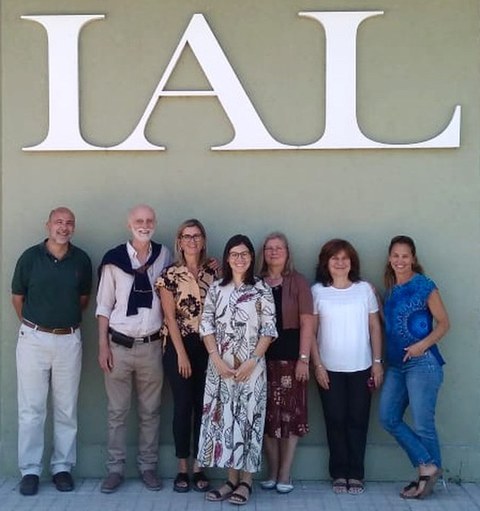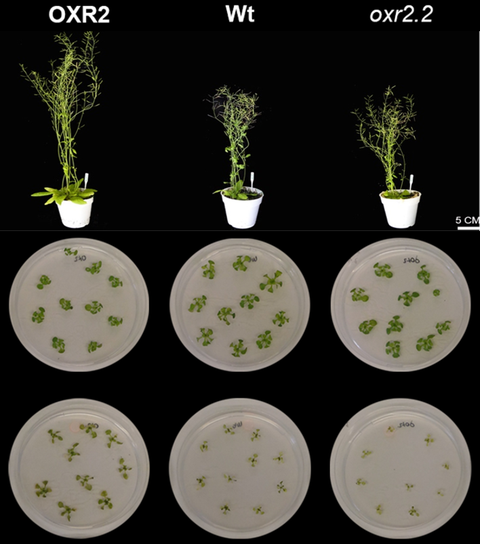Aug 14, 2020
German-Argentinean doctoral programme bears first fruits

Regina Mencia (middle) with her supervisors Prof. Elina Welchen (left) and Prof. Jutta Ludwig-Müller (right) as well as other representatives of the UNL and the Doctoral Committee.
The Faculty of Biology at TU Dresden and the Faculty of Biochemistry and Biological Sciences at the Universidad Nacional del Litoral (UNL) in Santa Fe, Argentina have had a very special partnership for more than five years. A bi-national doctoral programme not only enables doctoral students from both research institutions to spend a longer period of time abroad, but also offers a double degree in Biochemistry and Applied Biology. The programme is funded by the German-Argentinean University Centre (DAHZ-CUAA). Dr. Regina Mencia from Argentina was the first doctoral student to complete her doctorate under this programme at the beginning of this year. The success of her German-Argentinean cooperation has now been crowned by a joint publication in the renowned journal "Plant Physiology".

Arabidopsis thaliana plants, which either produce the OXR2 protein in increased quantities (left), or carry a corresponding gene mutation (right). In the middle, you can see the unmodified plant (Wt). The upper part of the figure shows the improved growth of the plants, the lower part shows their improved survival after inoculation with the plant-damaging bacterium Pseudomonas syringae.
Under the supervision of Professors Jutta Ludwig-Müller (TUD) and Elina Welchen (UNL), Regina Mencia researched a new method for increasing the resistance of plants to pathogens as part of her doctorate. Between 2017 and 2018 she was a guest at the Chair of Plant Physiology at TU Dresden for one year. Here she investigated the influence of the mitochondrial protein Arabidopsis thaliana Oxidation Resistance 2 (AtOXR2) on plant defence.
"At TU Dresden, I was able to carry out experiments for which we in Santa Fe do not have the appropriate laboratory equipment or the necessary expertise. I also had the opportunity here to exchange ideas with many other scientists, attended numerous courses and conferences. As a result, I have advanced not only scientifically, but also personally and culturally. I was warmly welcomed in the research group of Prof. Ludwig-Müller and very well supervised. I could well imagine returning to TU Dresden one day", Dr. Mencia describes her guest stay.
During her investigations, she found out that the protein AtOXR2 has an influence on the salicylic acid pathway of the plant, thereby increasing the plant's resistance to pathogen infections. Salicylic acid is a chemical substance that occurs as a plant hormone in the leaves, flowers and roots of various plants and plays an important role in the defence against pathogens. The overexpression of AtOXR2 leads to a general activation of the salicylic acid-signalling pathway, the plant boosts its defense and becomes resistant to the attack of pathogens.
Professor Ludwig-Müller explains the relevance of these investigations: "The results are very promising for applications. Whereas in previous studies, salicylic acid-based resistance led to a deterioration in plant growth, the plants from this project showed improved growth in addition to resistance".
Original publication:
Regina Mencia, Gabriel Céccoli, Georgina Fabro, Pablo Torti, Francisco Colombatti, Jutta Ludwig-Müller, Maria Elena Alvarez, Elina Welchen. „OXR2 increases plant defense against a hemibiotrophic pathogen via the salicylic acid pathway” Plant Physiology. Published July 2020. DOI: https://doi.org/10.1104/pp.19.01351
Interview of the Universidad Nacional del Litoral de Santa Fe with Regina Mencia (Spanish): https://www.youtube.com/watch?v=TGl7gMpsVlI
Media inquiries:
Prof. Jutta Ludwig-Müller
Chair of Plant Physiology
Tel.: 0351 463-33939